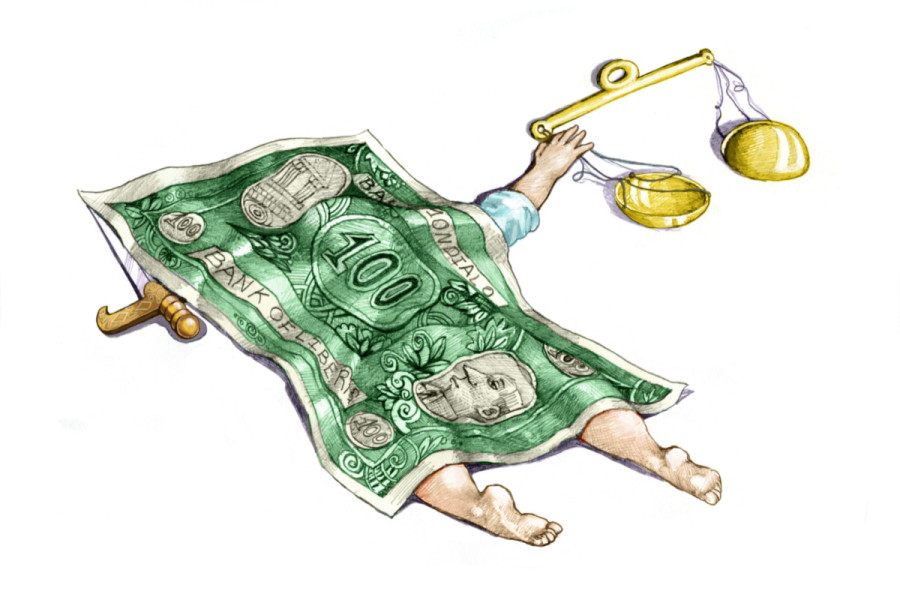Columns
Exorbitant cost of justice
Lawyers are expensive, free legal aid is fiction, and the court fees are not negligible.
Nishant Pokharel
Law students will come across various maxims and jargons in their professional career. Among them, the term justice is the most ambitious, indefinite, subjective, vague and personal expression that one will stumble into in the legal world. However, when one comes down from the ivory tower of scholarly research, the reality of the word turns from a glorifying actuality to a big lie—a great disappointment.
As part of my first litigation, advocating in favour of prisoner enfranchisement, I had the opportunity to acquaint myself with the procedural elements of filing a petition at the Supreme Court. Not only did I get a chance to interact with bureaucrats seated on their cushioned revolving chairs, I also had the chance to interact with service seekers in the corridors with their hands on their brows awaiting "justice". The interactions, discussions and banters did nudge me; but by experiencing the court procedure, I was convinced that justice is a word that's not only difficult to receive but also hard to seek.
The great justice lore
Whenever someone enters the Supreme Court, cramped offices, incommodious crowds of people, congested departments and a mazy exit greet them. As a student myself, I had a fetish for justice. I expected the court to be not just an office, but a temple, "a temple of justice". I was impressed by the idea of individuals asking for their entitled rights and fighting for their protection. But, far from it, individuals had no feeling of being a privileged citizen, rather a subject of pity. I saw individuals begging to be given "mercy". A perplexing proposition: When someone is entitled to a right, why ask for mercy?
Justice is a fancy word and only those who have the necessities have the luxury of asking for it. Obviously, it is absurd to expect a debt-ridden farmer in Karnali to comprehend fundamental rights like the right to live with dignity, or a minimum wage labourer working in a brick factory to understand their entitled right to live in a clean environment. And it is even more outrageous to expect the debt-ridden farmer to leave his field barren to go ask for his right. Or anticipate the labourer fighting for his rights—leaving his family to fend for themselves. Justice exists only for those that have the means to attain it.
To keep one's head above water, various provisions of pro bono and pro se exist within the legal framework, including access to justice commission. There are fancy legal provisions, like the translation and interpretation act which mandates the government to provide translation facilities in court. The constitution under Article 20 sub-article 10 affirms free legal aid as a fundamental right. However, on the ground, we see individuals waiting in front of the free legal aid department for hours, but to no avail. Scenes like these make you understand that laws in Nepal are beautifully written but rarely implemented. Similarly, these laws that try to make laws more comprehensible and accessible need some level of comprehension and access beforehand, which are an epitome of legal tautology.
While every report submitted by the Supreme Court lauds its efforts to make justice attainable and accessible, in reality, the fact that a writ petition can only be filed at the Supreme Court makes justice unattainable and inaccessible. Similarly, Nepali is the official language which is used in the courts; but many Nepalis don’t have Nepali as their native language. The Nepali legal jargon used in the statutes also adopts words from other languages extending from English to Farsi; rendering the comprehension of law more challenging. These issues make the audience of common law an academically informed citizen. As most Nepalis are not legally informed, they have to hire people that are. Then, lawyers become necessary for anyone. However, lawyers are expensive, and most people can’t afford them, and free legal aid is pure fiction.
Money matters
Lawyers are not the only expensive component of one's legal journey, the court fees are not negligible either. To file a constitutional writ, you have to pay Rs5,000; for a regular writ, the fee is Rs500. Add to that the cost of printing hundreds of pages of papers, providing a pen-drive to the court and printing on expensive Nepali paper. It is not cheap as commonly perceived. Including miscellaneous costs—and excluding travel, food and lodging—the price tag can range from Rs2,000 to Rs10,000 or even more. While considering the cost, we must understand that we live in a country where 18 percent of the population lives in absolute poverty, on less than a dollar a day.
The cost makes the people of the country reluctant to go seek justice. It is expensive for many citizens to pay for justice. And we should realise that these people are the ones who are in dire need of court protection: They are predominantly oppressed, suppressed, neglected and ignored by the government. Therefore, isn't it the duty of the court to protect them? A duty to deliver justice? Money matters, but it shouldn't. At least for me, the justice I know didn't have a price tag on it.
The judiciary is at its lowest level—embroiled in controversy and struggling to retain an image. Public trust in the judiciary is plummeting—impeachment protests, lawyers wrangling, bickering between officials and corruption scandals. Day by day, the courts depart more and more from the public. The judiciary exists in the bastion of people's trust and their faith in justice. But the cost of justice is immense, making it unreachable and inaccessible for many citizens. The current system has turned justice into a farce—a legal fiction, a mockery of ideals and a great disappointment. But it shouldn't be like this. The court should make substantial efforts to curb this enormous cost of justice—not by bombarding a new report with lush language but by taking decisive action.




 13.12°C Kathmandu
13.12°C Kathmandu















